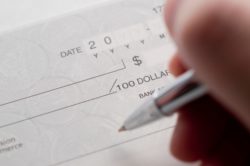Top Class Actions’s website and social media posts use affiliate links. If you make a purchase using such links, we may receive a commission, but it will not result in any additional charges to you. Please review our Affiliate Link Disclosure for more information.
If consumers are hit with a Glacier Bank returned check fee, they will be charged a $30 fee to their account for each returned item.
What is a Returned Check Fee?
Returned check fees are a normal part of having a bank account. These fees are charged to an account when consumers attempt to cash a bad check or charge a debit card. Bounced checks can be a case of non-sufficient funds and human error, or could be the result of fraudulent scams.
Although it is not the check recipient’s fault, attempting to deposit a bounced check costs the bank time and money. Returned check fees aim to recoup these losses.
Bad Checks
If you do write a check that bounces, the recipient might be charged a Glacier Bank returned check fee. According to Wallet Hub, you’re able to request the recipient try to deposit the check again, but the recipient may decline. Being up front about the fact the check bounced and paying the recipient the amount owed plus any returned-check fee should smooth things over. You should be able to avoid being sued or facing criminal charges if you resolve the outstanding payment.
If you don’t have a history of bouncing checks, you can ask your bank to waive the NSF fee as a one-time courtesy. If the bank has issued several NSF fees on one check, it’s worth asking about getting most, if not all the fees, waived.

If it’s still not possible to obtain the money from the check, you may have to send a formal demand to the issuer and the issuer’s bank. Such a bad check notice is best sent by certified mail with a return receipt requested to ensure all of your steps to resolve the situation are properly documented.
NSF Fees
When consumers write a bad check, they are also charged a fee. These fees may be listed in a bank statement as “non-sufficient funds” or “NSF” fees, “insufficient funds” fees, or under other names. However, they all mean the same thing: a checking account doesn’t have enough money to cover a transaction.
Additionally, if the account holder writes a check that is returned, the check recipient’s bank may charge an additional returned check fee on top of any non-sufficient funds fee charged by the bank.
The maximum allowed returned check fees will vary by state. In some states, these NSF fees are capped at a dollar amount between $20 and $40. In other states, the returned check fee amount depends on the total check amount. For example, in Florida, the following rules apply:
- $25 if the check amount is less than or equal to $50
- $30 if the check amount is between $51 and $300
- $40 if the check amount is between 301 and $800
- 5 percent of the check amount if the total is over $800
Similar rules apply for Georgia, Idaho, Louisiana, and Ohio.
Although one returned check fee may not be the end of the world, consumers have complained about being charged multiple fees on a single returned check. These recurrent charges are allegedly caused by banks or credit unions attempting to reprocess the payment multiple times.
When you have a Glacier Bank returned check fee, or a returned check fee from another bank, you will be charged a pre-determined amount. According to Glacier Bank’s fee schedule, their returned item fees are $30 per item. However, around the country, overdraft fees are increasing.
Are Banks Being Investigated For Improper Bank Fees?
Attorneys are looking into several banks to determine whether or not consumers are being taken advantage of. Consumer protection laws protect individuals from deceptive behavior, including any misleading or unlawful actions taken by banks and credit unions.
Experienced lawyers are looking into several banks and credit unions for improper fee collection, including:
- Bancfirst
- Bell Bank
- Busey Bank
- Center Bank
- CenterState Bank
- Flagstar Bank
- Glacier Bank Wings Federal Credit Union
- Midwest One
- NBT Bank
Like other banks on this list, Glacier Bank may not have been accused of unlawfully charging fees. However, the bank is being investigated by attorneys to see if they are taking advantage of consumers with deceptive Glacier Bank returned check fee practices.
If you believe you have been wrongly charged NSF fees, or charged multiple times for a transaction, an experienced NSF fee attorney could help define if you are a victim of deceptive checking account overdraft programs.
Join a Free NSF Fee Class Action Lawsuit Investigation
You may qualify to join this NSF fee class action lawsuit investigation if you were unfairly charged NSF fees by one of these banks:
- Bancfirst
- Bell Bank
- Busey Bank
- Center Bank
- CenterState Bank
- Flagstar Bank
- Glacier Bank Wings Federal Credit Union
- Hudson Valley Credit Union
- Midwest One
- NBT Bank
ATTORNEY ADVERTISING
Top Class Actions is a Proud Member of the American Bar Association
LEGAL INFORMATION IS NOT LEGAL ADVICE
Top Class Actions Legal Statement
©2008 – 2024 Top Class Actions® LLC
Various Trademarks held by their respective owners
This website is not intended for viewing or usage by European Union citizens.
















One thought on What Happens When You Have a Glacier Bank Returned Check Fee?
I was sent a card saying I was part of the Glacier Bank lawsuit. What ever happened to the results? Thank you